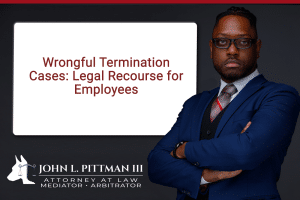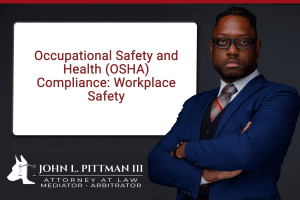## Understanding Steps Personal Injury Accident
A personal injury accident can be a life-altering event, affecting not only the injured person but also their families and loved ones. Understanding the essential steps to take following such an incident is crucial for securing one’s rights and achieving fair compensation. The term “Steps Personal Injury Accident” encompasses the critical actions that should be undertaken immediately after an accident to ensure the well-being of the victim and to protect their legal interests.
In Texas and California, where John Pittman III practices law, the aftermath of a personal injury accident can involve various legal complexities and challenges. Victims may face medical bills, lost wages, and emotional trauma, all of which must be addressed in a timely manner. Knowing the necessary steps to take can significantly influence the outcome of potential legal claims. This understanding is not just about managing immediate concerns but also preparing for any future legal proceedings that may arise from the accident.
By taking well-informed steps following an accident, victims can effectively improve their chances of receiving appropriate compensation. Engaging with legal resources, documenting the incident properly, and understanding one’s rights are all integral to navigating the post-accident landscape. Being proactive in these areas can also contribute to peace of mind amid the chaos following a personal injury accident.
## Importance of the Steps Personal Injury Accident
Recognizing the importance of the steps to take after a personal injury accident cannot be overstated. The decisions made immediately following an incident can have lasting ramifications on both personal recovery and the potential for legal claims. Whether it’s a car accident, slip and fall, or workplace injury, knowing how to respond can significantly mitigate negative outcomes.
In a legal context, taking prompt and appropriate action is essential for preserving evidence that may be critical in future claims. This includes gathering witness information, obtaining police reports, and documenting injuries. Neglecting these crucial actions may weaken a case, leading to unfavorable settlements or even the dismissal of claims. In essence, the foundational steps taken right after an accident can lay the groundwork for a strong legal case if one is pursued.
Moreover, the emotional and physical well-being of the injured person is paramount. Establishing a solid support system and acquiring medical attention promptly are vital steps that not only assist in recovery but also signal to insurance companies and other entities that the injured party is serious about their health and rights. Understanding the legal and emotional aspects of the situation can bring clarity during a chaotic time, emphasizing the necessity of knowledge in such circumstances.
## Legal Framework Influencing Steps Personal Injury Accident
The legal framework governing personal injury accidents is multifaceted, incorporating various statutes, regulations, and case law principles. Understanding this legal context is critical for anyone navigating the aftermath of an accident. In both Texas and California, the law distinguishes between different types of personal injury claims, such as negligence, strict liability, and intentional torts.
Negligence is the cornerstone of most personal injury cases. To establish a negligence claim, the injured party must prove that the other party owed a duty of care and failed to fulfill that duty, resulting in injuries. This principle sets the stage for why documentation and evidence-gathering are crucial steps following an accident. By understanding how negligence is defined and applied, victims can better prepare themselves for pursuing compensation.
Additionally, statutes of limitations dictate the time frame within which legal action must be initiated. In California, for instance, the time limit for personal injury claims typically spans two years from the date of the accident, while Texas offers a similar two-year period. This underscores the importance of taking prompt action after an incident, as delays can result in losing the right to file a claim. Furthermore, understanding the specific legal standards in your jurisdiction can help navigate the complexities of the claims process more effectively.
## Real-World Illustrations of Steps Personal Injury Accident
Real-world examples illuminate the critical nature of the steps taken after personal injury accidents. Each scenario provides valuable lessons on what to do—and what not to do—after an incident. For instance, consider a scenario in which an individual is injured in a car accident. In this instance, the victim accurately records the details of the incident, gathers witness statements, and seeks medical attention, which ultimately supports their claim upon filing with their insurance company.
Conversely, let’s examine a case where the injured party fails to document the scene or seek immediate medical attention. Without crucial evidence and a medical record of their injuries, this individual may face significant challenges when attempting to establish liability and secure compensation. This example underscores the importance of response time and thorough documentation in personal injury situations.
Another example can be seen in workplace injuries. An employee who is involved in a slip and fall accident at work may immediately report the incident to their supervisor, document safety conditions, and take photos of the area where the accident occurred. This proactive approach not only assists in their recovery but also equips them with the necessary information to support their workers’ compensation claim down the line. Each of these real-world scenarios reinforces the vital steps that must be taken following a personal injury accident.
## Actions Victims Can Take After a Personal Injury Accident
After a personal injury accident, victims should prioritize a series of actions to safeguard their rights and well-being. Securing immediate medical attention is perhaps the most crucial step, allowing for appropriate diagnosis and treatment of injuries, which is vital not only for recovery but also for any potential legal claim. Medical documentation can serve as essential evidence in establishing the extent of injuries suffered.
Once medical issues are addressed, victims should begin gathering evidence related to the accident. This involves collecting accident reports, photographs of the scene, and witness contact information. Documenting the circumstances surrounding the accident, including any relevant environmental conditions, can serve as a critical component of a case later on. Victims should also keep detailed records of their medical treatments, expenses, and any other costs incurred due to the accident.
In addition to physical evidence, emotional and psychological recovery steps are equally important. Victims should seek support from friends, family, or mental health professionals to process their experiences and cope with any distress resulting from the accident. Moreover, maintaining open communication with insurance companies is crucial, as adjustments and negotiations may be required to settle any claims. Familiarizing oneself with rights and potential claim outcomes can empower victims and enhance their recovery journey.
## Avoiding Common Pitfalls After Personal Injury Accident
Navigating the aftermath of a personal injury accident can be fraught with challenges, and there are several common mistakes that victims often make. One prevalent pitfall is the failure to seek prompt medical attention. Skipping medical evaluations may result in complications that could have been avoided and also complicates an eventual legal claim. Providing insurance companies or the opposing party with an opening to argue that injuries were not serious can significantly undermine a case.
Another common error involves underreporting the accident to insurers or failing to collect sufficient documentation. Victims might feel overwhelmed and unsure of what information is relevant at the moment. However, insufficient documentation can lead to disputes regarding liability and compensation. It’s essential to collect witness statements and other forms of evidence that can clarify the circumstances of the incident.
Additionally, victims should steer clear of discussing the accident details on social media platforms. Any posts or comments regarding the accident can be construed in ways that diminish a claim. Insurers may monitor social media activity to find opportunities to weaken a victim’s position. Therefore, maintaining discretion and privacy concerning the incident can safeguard one’s legal rights and strengthen the chance of achieving fair compensation.
## When is it Necessary to Consult an Attorney?
Determining the appropriate time to consult an attorney following a personal injury accident can be crucial to the claim outcome. While some individuals may feel capable of handling minor incidents on their own, consulting a knowledgeable attorney is advisable when injuries are significant, liability is contested, or damages exceed a certain threshold. In many cases, the complexities of personal injury law necessitate professional guidance to navigate effectively.
An attorney can provide critical insights into the legal framework, help gather evidence, and communicate with insurance companies on behalf of the victim. Their understanding of state-specific laws can inform victims about their rights and the types of compensation for which they may qualify, making it easier to establish a strong case. Consulting an attorney also aids in managing the increasing pressures and stress typically associated with personal injury claims.
Additionally, if an insurance company is not offering a fair settlement or is disputing liability, it’s imperative to seek legal representation. Attorneys can negotiate on behalf of clients, ensuring their cases are valued correctly and advocating for their interests. Retaining an attorney early in the process can prevent future complications, solidify a victim’s position, and contribute to a more favorable outcome.
## Advantages of Legal Representation for Personal Injury Claims
Engaging with legal representation for personal injury claims offers numerous benefits that can significantly impact the outcome of a case. First and foremost, an attorney has the skills necessary to conduct thorough investigations, compile vital evidence, and build a compelling case. Their experience allows them to identify potential challenges and proactively address them, ultimately strengthening the likelihood of a favorable settlement or verdict.
Furthermore, attorneys are well-versed in negotiation tactics and have access to industry-standard practices that inform them on what constitutes a fair settlement. This capability is essential, as many insurance companies aim to minimize payouts. A knowledgeable attorney can advocate assertively on behalf of the injured party, leveraging their insights and expertise to negotiate just compensation that accurately reflects the nuances of the injury and its impact.
Additionally, having legal counsel provides peace of mind during a tumultuous time. Knowing that an experienced professional is handling the nuances of a case allows victims to focus on their recovery and emotional well-being. This support not only helps alleviate stress but also ensures that victims do not inadvertently jeopardize their claims through missteps or oversights.
## How John Pittman III | Attorney At Law, APC Can Support Victims
John Pittman III | Attorney At Law, APC is dedicated to helping personal injury victims navigate the complexities that arise from their accidents. With deep understanding and local insight into both Texas and California’s legal landscapes, John Pittman III offers personalized support to clients, ensuring their unique situations are handled with the utmost attention and care. This tailored approach has made him a trusted advocate for anyone facing the aftermath of a personal injury accident.
One of the key ways John Pittman III assists victims is through comprehensive case evaluations. He and his legal team thoroughly assess the details surrounding each case, identifying potential legal pathways that may lead to compensation. Armed with nuanced knowledge of personal injury law, they guide victims through their options and help them make informed decisions moving forward. This kind of individualized attention can make all the difference in securing just compensation.
Moreover, John Pittman III’s commitment to open and thorough communication ensures that clients feel informed and supported throughout the legal process. Victims can focus on their recovery while knowing that their legal rights are actively being protected. As they navigate the often-complicated terrain following a personal injury accident, having a seasoned professional like John Pittman III in their corner means having someone who understands the process, advocates fiercely, and strives to achieve the best possible outcome.


